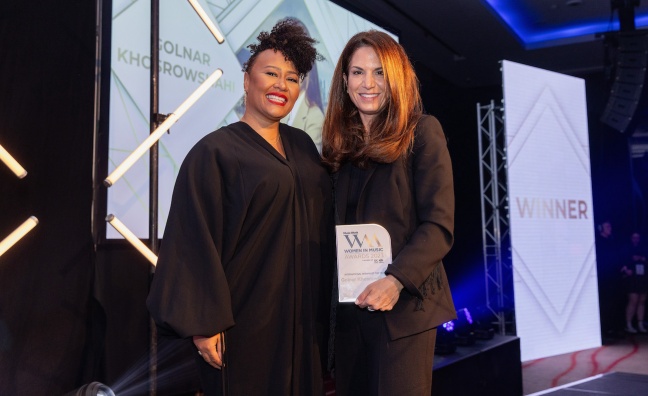At the Women In Music Awards 2023, we celebrated the achievements of 13 game-changing executives and artists as the industry came together to honour their work. Music Week has spoken to all 13 winners to tell their stories.
Words: Anna Fielding
This year’s winner of the International Woman category, Golnar Khosrowshahi, is founder and CEO of Reservoir, which is headquartered in New York City and with operations in Los Angeles, Nashville, Toronto, London, and Abu Dhabi. Established in 2007, Reservoir is the first female founded and led publicly traded independent music company in the US.
Under Golnar Khosrowshahi’s leadership, Reservoir has grown to own and administer over 140,000 copyrights and 36,000 master recordings. Among many awards for the company and founder, Reservoir has won the Independent Publisher Of The Year category at the Music Week Awards.
In addition to her role as CEO of Reservoir, Khosrowshahi serves as a director on the board of the National Music Publishers’ Association, working to ensure fair compensation for songwriters and their representatives. She also sits on NMPA’s S.O.N.G.S. Foundation board of directors, an organisation that raises funds to support career songwriters. Working alongside artist director and cellist Yo-Yo Ma for over a decade, she served as board chair of the musical collective, Silkroad. In 2022, she was elected to the board of directors for the New York Philharmonic.
Furthermore, Golnar Khosrowshahi is a classically trained pianist through the Royal Academy of Music in London, England and the Royal Conservatory of Music in Canada. She holds an MBA from Columbia University in New York City and a BA in Political Science from Bryn Mawr College.
Here, our WIM International Woman for 2023 opens up about how the industry has changed, supporting women executives and Reservoir’s thriving female music creatives…
How do you feel about winning the International Woman of the Year award? There are many influential women who have won it before you.
“I'm very excited. It's funny because I had planned to be in London that week anyway. I’m usually there because it always coincides with my grandmother's birthday. She's 94 now, so we just celebrate her every year. And then when I got the news, I was very, very excited. It’s also quite an honour to keep company with the previous winners and being recognised outside of the United States is a big deal too. We have a significant business in the UK, through Chrysalis, as well as through Reverb. So it is quite an honour, given our presence there and having spent my childhood there.”
Reservoir is the first female-founded and led public independent music company in the US – does that surprise you?
“It does. The stats are alarming. I remember when Bumble went public. It was heralded as something like the 30th female-led company to go public, in any category. So when we went public, we looked at the stats too. And you can give yourself a pat on the back, but at the same time you do say to yourself, ‘How can this not have happened until now?’. What have the obstacles been? What has stood in the way of this having happened?”
Do you think your decision to go public will pave the way for more female entrepreneurs in the music space?
“I hope so. Although I don’t think people really set out with a target of becoming a public company. I think it’s something that evolves and it becomes a financial play. It’s not a goal that I set out, it’s a strategic decision that we made. It was when we started looking at how we were going to package this that we realised what the data was around female-founded and female-led companies. We run an organisation where we have, quite organically, a lot of women in leadership positions. I've got to believe that some of that is cultural. And a lot has to do with how we have grown from within and how we really do look at filling our positions with the best talent. And some of those are men. And some of those are women. It makes it attractive for recruiting to know that this is a place where you can thrive.”
Particularly on women, particularly on women who have families, there are different demands at different points in your life. And I think we're conscious of that
Golnar Khosrowshahi
How do you think the industry has changed in terms of advancing the careers of women?
“I think it has changed and because of things like MeToo, attention has been drawn to women in the industry. I certainly have those experiences of sitting in rooms with only men. I have them today, but they are less frequent. But outside of the company I’m certainly not in a work environment where it’s 50/50 all of the time. But it’s getting better and that’s because there are conversations about it, there are events like Women In Music, there are a lot of organisations that are recognising women in studios, women musicians and so on.”
How do you help women thrive at Reservoir?
“It starts with the idea that good people are hard to find. So, once you’ve found those good people, you need to be able to adapt with them. I raised my children as I raised this company, so I know what the push and pull, the constant need for compromise feels like. That doesn’t just help me relate to women, it’s an idea of how people’s lives change and evolve. I wouldn’t say we have a specific policy, I would say we want to nurture our talent. If you acknowledge you have good people, then your objective is to make sure that you can retain those people and that they can grow within the company. And that pace of growth can shift. Because, particularly on women, particularly on women who have families, there are different demands at different points in your life. And I think we're conscious of that.”
You seem to have put a lot of thought into staff retention as well as staff acquisition.
“Yes, and we’re very proud of that. We have not had any senior management turnover since inception. Our employee retention is extremely high across the board. And at that senior level, we've had no turnover.”
In terms of the frontline roster, how is the company doing in terms of signing female hitmakers to join the likes of Ali Tamposi?
“Well, I think it’s an appropriate time to highlight Emeli Sande. Certainly in the early days, Ali was one of our front-running female songwriters on the roster, and continues to be so. We recently added Steph Jones. There are a lot of women on the roster. I went to see Trousdale last week. It all comes back to culture and we look at the company, at our staff, at our roster very much through the same lens. We're certainly conscious of having diversity, but that’s more of a value than deliberately saying, okay, we're going to go out and sign a specific demographic.”
How closely do you get involved in big catalogue acquisitions? What are the key negotiating skills for securing a deal?
“I am very closely involved. The entirety of my focus was on catalogue acquisitions in the early days, that's how we grew. And a lot of those acquisitions were significant. In so far as their size goes, we source through a number of different channels that could be from the creative team, it could be through attorneys, they are all relationship-driven sourcing. As you know, this is a completely disenfranchised industry insofar as how deals come about, unless you're dealing with the larger transactions that are governed by a process. From there, we usually do a preliminary assessment. Our DLT meets every morning at 9.30. I'm on that call every morning at 9.30. I’m heavily involved on every acquisition, small or large, every roster signing. I'm probably more involved in the underwriting when it's a larger deal. In that I'm aware of all the issues I'm aware of the risks we're facing. We take a very very methodical approach to that underwriting and to our capital deployments. So I can't really risk not not being involved there.”
Finally, as Reservoir approaches its 20th anniversary in a few years’ time, what’s the long-term vision for the company? How can it continue to grow in a competitive landscape?
“It is a competitive landscape. And I don't really see us shifting our strategy, in that we want to continue to scale the business, we want to continue to build the roster. And we want to continue to do that very much in the same way that we have, because that's a formula that's worked for us. That formula is based on high-quality music, and high-quality songwriters, and artists that we want to be in business with for a very long time. This is a long-term business, this is not the kind of business where we are looking at realising a return in a year. We are looking at building a catalogue and continuing to build the catalogue, we're looking at developing the business in the Middle East. And so I don't really see us shifting our focus.”
Click here for more from Women In Music 2023.









